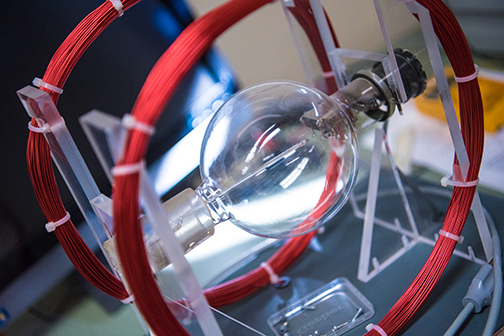
Physics
This is an archived copy of the 2018-19 catalog. To access the most recent version of the catalog, please visit https://catalog.ndsu.edu.
Physics Major
Students who complete a major in Physics are prepared for careers in industrial and governmental research and development and for graduate study in physics, astronomy, engineering, medicine, materials science, and environmental science. In-depth preparation is also provided for teaching in secondary schools.
Students interested in Physics Education are encouraged to declare a double major in their discipline and in education (i.e., Physics Education and Physics). Such double majors may be earned by the successful completion of a few additional credits. Students should contact their adviser, the School of Education, or the Office of Registration and Records for details and are encouraged to declare their primary and secondary majors with the Office of Registration and Records, Ceres Hall 110.
Optical Science and Engineering Option
This option includes an interdisciplinary optics/photonics sequence of courses taught by the Departments of Physics and the Department of Electrical and Computer Engineering using a state-of-the-art optics teaching laboratory. This is the only regional program of its type. Optics and lasers are enabling technologies and are applied in most high-tech experiments, communications, devices, medical diagnostics, media, etc. There are more than 5,000 optics-related companies in the United States alone, but even more important, photonics provides the technical foundation for many more. Optical science and engineering has exploded to encompass nearly all fields of science and technology with a consequent shortage of individuals trained in the field. The optical science and engineering option will enhance any job search.
Physics Minor
A Physics minor consists of 19 credits, of which at least eight credits must be completed at NDSU.
Plan of Study
Please note this is a sample plan of study and not an official curriculum. Actual student schedules for each semester will vary depending on start year, education goals, applicable transfer credit, and course availability. Students are encouraged to work with their academic advisor on a regular basis to review degree progress and customize an individual plan of study.
| Freshman | |||
|---|---|---|---|
| Fall | Credits | Spring | Credits |
| PHYS 171 | 1 | PHYS 251 & 251L | 5 |
| MATH 165 | 4 | PHYS 251R | 1 |
| CHEM 150 & CHEM 160 | 4 | MATH 129 or 329 | 3 |
| ENGL 110 or 120 (based on placement) | 4 | MATH 166 | 4 |
| Wellness Gen Ed | 2 | CHEM 151 & CHEM 161 | 4 |
| 15 | 17 | ||
| Sophomore | |||
| Fall | Credits | Spring | Credits |
| PHYS 252 & 252L | 5 | CSCI 161 | 4 |
| PHYS 252R | 1 | PHYS 350 | 3 |
| MATH 265 | 4 | MATH 266 | 3 |
| CSCI 160 | 4 | COMM 110 | 3 |
| Humanities/Fine Arts Gen Ed | 3 | Humanities/Fine Arts & Global Perspectives Gen Ed | 3 |
| 17 | 16 | ||
| Junior | |||
| Fall | Credits | Spring | Credits |
| PHYS 355 | 3 | PHYS 370 | 3 |
| PHYS 360 | 3 | ENGL 324 | 3 |
| MATH 4XX Math Elective | 3 | PHYS 361 | 3 |
| Free elective | 3 | MATH 4XX Math Elective | 3 |
| Free Elective | 3 | Free Elective | 2 |
| 15 | 14 | ||
| Senior | |||
| Fall | Credits | Spring | Credits |
| PHYS 462 | 3 | PHYS 489 | 2 |
| PHYS 485 | 3 | PHYS 481 | 3 |
| PHYS 411 & 411L | 4 | PHYS 486 | 3 |
| PHYS 488 | 1 | Physics Elective | 3 |
| Social and Behavioral Science Gen Ed | 3 | Social and Behavioral Science & Cultural Diversity Gen Ed | 3 |
| 14 | 14 | ||
| Total Credits: 122 | |||
